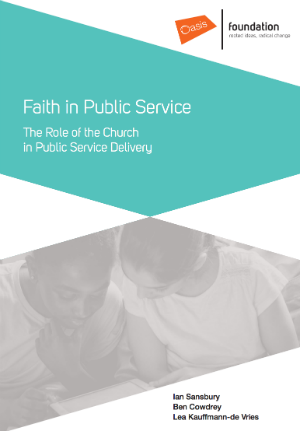Public 'don't trust' church service provision
“Churches must do more to win public confidence and equip themselves for public service” says new report
 While Government has reiterated its commitment to putting faith and voluntary groups at the heart of the Big Society, the general public fail to share the enthusiasm for this shift in service provision, according to new research from the Oasis Foundation, the new research and policy unit of the Oasis group of charities and social enterprises.
While Government has reiterated its commitment to putting faith and voluntary groups at the heart of the Big Society, the general public fail to share the enthusiasm for this shift in service provision, according to new research from the Oasis Foundation, the new research and policy unit of the Oasis group of charities and social enterprises.
The Foundation's Faith in Public Service report found Britons have serious reservations about the ability of faith groups to deliver mainstream public services: 65 per cent of respondents had concerns about the involvement of faith in health care, and another 55 per cent were reluctant to see church groups increase their role in education.
However, when it comes to less complex community services such as food-banks, youth groups and debt advice, 65 per cent of the public would trust church groups to deliver.
The report found that a perceived lack of skills, training and expertise is the biggest barrier to trust in church-led service provision, with 58 per cent of respondents citing this as a factor. However, 37 per cent were concerned that churches would use service delivery as an opportunity to attempt to convert people and over a quarter (26 per cent) had concerns that minority groups such as LGBT people would be excluded.
These concerns were significantly more pronounced among young people with 55 per cent and 41 per cent of 18-24 year olds respectively perceiving the risks of proselytism and exclusion to be a barrier to church-led delivery of public services.
Regardless of public perception however, the report cites evidence of the difference that local church-led social action is making to vulnerable communities across the UK. It and argues that the Church is well placed, nationally and locally, to play a more significant role in public service delivery.
Baptist minister Steve Chalke, Founder and Global Leader of Oasis said, 'Leading experts and thought leaders continue to articulate the opportunity for churches and groups of churches to step forward confidently into the space that is increasingly being vacated by the state and to deliver inclusive, integrated public services within their communities.
'Increasing numbers of churches are doing just that, but if the Church is to truly embrace this opportunity and deliver more complex public services on a national scale it still has a big job to do in managing perceptions and winning over the trust of the general public.'
The Oasis Foundation officially launched at a reception at the House of Lords on 25 April.
Baptist Times, 29/04/2016